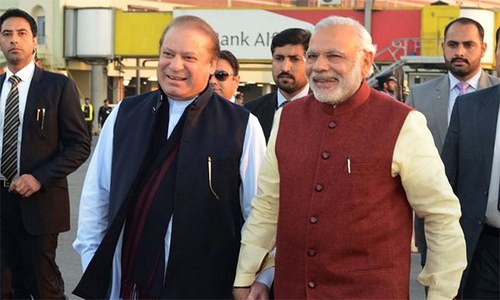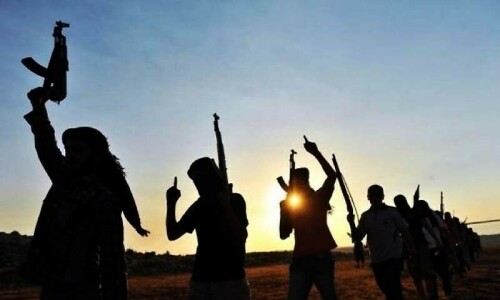IF sneak reporting a royal wedding was not an exacting enough task last week, Santa brought the media here their latest package: they were required to figure out what could have likely taken place in a meeting between the leaders of Pakistan and India?
And before that, they were to take part in a huge exercise to decide who did the honours from the meeting rest with. It was easier reporting on the wedding from this side of the wall.
Who arranged Prime Minister Narendra Modi’s visit to Pakistan? In the presence of so many versions, there are so many answers to the question. It depends on which side of the political divide you are and which passport you travel by, but ultimately, this debate takes centre-stage since the ‘landmark’ tea meeting off Raiwind, which remains wrapped in cold secrecy, has so far thrown up very few other leads for anyone to work on.
There are many answers:
Mr Modi came on his own. Or he was invited by Prime Minister Nawaz Sharif: In either case it could not have happened out of the blue. The timing when they wanted to share it with the people was their prerogative, but it doesn’t seem probable that Lahore suddenly beckoned on their map.
It was the result of some sustained effort carefully hidden from the media, capped by the recent visit by Indian External Affairs Minister Sushma Swaraj: Most likely. That visit by Ms Swaraj must have been a factor, notwithstanding her remarks projecting it as a last-minute stopover in Lahore.
The wedding of Prime Minister Nawaz Sharif’s granddaughter was strictly off limits to media until came along a guest the Sharifs had to throw open their doors and arms to. Prime Minister Modi landed in Lahore on Friday afternoon and jumped into a helicopter with his hosts for a quick ride to the glittering Jati Umra residence of the Sharif family, where a Mehndi event was about to unfold.
There, lined up to shake hands with the unusual guest were young men dressed in ceremonial suits: Prime Minister Nawaz Sharif’s sons Hassan and Hussain as well as other male members of the family. The camera had finally managed to enter the prohibited territory. It now searched the faces of those in attendance for clues: Did they know who was coming and who had asked whom for the visit?
This is an important question, at least in this part of the world not just politically but culturally. The guests do not – cannot or should not – come uninvited. The guests are not supposed to insult their hosts with brief fleeting appearances.
If the ties between the two countries ending up at this wedding party are too tangled to yield to happy hasty flights in unconventional diplomacy, the etiquette of personal relationship on its own demanded that enough time was afforded for befitting hospitality.
In this case some of us were sure that a snub had taken place. It now remained to establish who had snubbed whom.
A day later, Pakistanis and Indians still concentrated their energies on guessing and claiming as to who was responsible for Prime Minister Modi’s surprise visit to Lahore on Christmas.
Some news reports from India tried to establish, albeit without too much hard evidence, that the visit had been planned much in advance. In Pakistan the stress was on proving that it was Mr Modi who had taken the trouble of coming on his own.
“Woh khud chal kar aaye” – he walked all the way of his own accord – was the refrain that was adopted by both the Pakistan officials and by the commentators on television here. The more patriotic amongst them, apparently, thought it as their duty to act as a shield against indigenous and foreign attacks on the Sharif government, accusing it of meek surrender against their personal desires (for business, of course) and to that of Prime Minister Modi’s.
Circumstantial evidence
The ties between Pakistan and India are marked by short bursts of the positive with vast frustrating stretches in the middle. Mr Modi’s presence in Lahore was part of the latest positive spurt in Pak-India relations beginning with the brief one-on-one interaction between the prime ministers of the two countries on the occasion of an international conference in Paris a few weeks ago.
Provided that the intent was there, there was circumstantial evidence to support the assertion that something had been cooking before Mr Modi announced his Lahore landing by a tweet and a set of Pakistani chefs was pressed into making vegetable bhujia for him in a hurry. There were small bits showing that this could not have happened out of the blue.
The steel magnate Sajjan Jindal happened to be around, just like Mr Modi’s stated purpose, to wish Mr Nawaz Sharif a happy birthday. Mr Jindal was famously named by Indian journalist Barkha Dutt as the man who had earlier brought the two prime ministers together for a secret meeting.
Then on the day of the big visit itself, at least one television channel managed to get through to some junior level security official who claimed they had been placed on ‘VIP’ duty since 6am. This didn’t quite tally with the version which said that Mr Modi had decided to make a pit stop in Lahore on way to New Delhi from Kabul at around noon on Friday.
Yet another piece of ‘evidence’ in support of it being a more planned Modi landing in Lahore linked it to Indian minister Sushma Swaraj’s recent visit to this country earlier this month. To many a trained eye, Ms Swaraj’s conclusion then was by no stretch significant and not worthy of her stature in the BJP setup in New Delhi – unless she had been successful in accomplishing something she was not ready to reveal as yet, like clearing the way for her prime minister to soon make a statement about friendship in the warm Sharif family setting.
There was actually a story in recent days which spoke of a conversation between Ms Swaraj and Maryam Nawaz Sharif, daughter of the prime minister, at the end of the Indian minister’s latest journey to Pakistan. Ms Swaraj is said to have told Ms Sharif: Tell your Dadi (Nawaz Sharif’s mother) I have kept my promise of playing my part of for peace…”
What was that Ms Swaraj had achieved here? Could it be a wedding invitation for a special guest from Delhi?
This is pure speculation which is fuelled by lack of any real direction emerging out of the meeting in Jati Umra on Friday. The official line is as unexciting and simple as ever. “Among the decisions taken was that ties between the two countries would be strengthened and also people-to-people contact would be strengthened so that the atmosphere can be created in which the peace process can move forward,” Reuter quoted the Pakistan foreign secretary Aizaz Chaudhry as saying.
The same report had Mr Chaudhry repeating the standard Pakistani line that “Prime Minister Modi arranged his landmark visit at the last minute on Friday.
“PM Modi phoned Pakistani Prime Minister Nawaz Sharif while on a visit to neighbouring Afghanistan and asked if he could make a stop in Pakistan on his way home.
“And the Pak PM said to him, ‘Please come, you are our guest, please come and have tea with me’,” he said.
What is routine here?
Analysts have since reached an agreement that, despite all the fanfare surrounding the visit, the Indian prime minister could hardly have brought Pakistanis a special gift signifying a leap in ties. He has simply taken a course similar to the one earlier treaded by former premier Mr Atal Behari Vajpayee.
Mr Modi apparently has chosen to engage in a dialogue with the neighbour that he otherwise chooses to accuse from podiums in Kabul and Moscow. Just as some 12 years ago, Mr Vajpayee came around to having a contact with Gen Pervez Musharraf.
Mr Modi may genuinely desire good ties with Pakistan, but much before that happens he wouldn’t want the western powers to blame him for not trying enough. India’s stance that it was not prepared to talk to Pakistan on any issue other than terrorism can get a concerted global response not dissimilar to the reactions that Islamabad would draw when it insisted on settlement of Kashmir over and above all else.
If anything, the progress that Mr Modi has made in Russia and Afghanistan, and his growing ties with the rest of the world, should make him more confident about trying all options with Pakistan. He can trust his friends to try a less friendly, even threatening, approach with Pakistan in case this abrupt diplomatic mission to Lahore fails to get things going in the ‘right’ direction.
This is more or less how it has been. These fast personal attempts at initiating some kind of movement have been more a norm than a novelty in India-Pakistan ties: Ziaul Haq’s cricket diplomacy, Vajpayee’s bus journey to Lahore, Musharraf’s handshake with Vajpayee at a Saarc summit, Modi and Nawaz coming together in Paris and the embrace between the two now in Lahore. It has been so because of an inability on both sides to acquire sustained pace towards good relations.
The difference this time is the perception that the business – trade – demands are on such a level that Pakistan and India can no longer deny them. It is these business prospects which then give rise to the uncharitable talk about how personal interests dictated the Indo-Pak agenda of today.
On the Pakistani side, the experience with China could well have been a factor in shaping the attitude of industry towards India. There is a kind of inevitability to the justification that whoever it may be – China or India – it doesn’t make much of a difference for the Pakistani manufacturers who must prepare themselves for a tough battle ahead anyway. This acceptance of peace in the business community makes it that much easier for politicians here to openly favour peace with India, until and unless they see some clear disapproval from the country’s security establishment.
Yet – reminds economist Shahid Kardar – it is the contacts between the people of India and Pakistan which are going to identify areas of economic ties. “The visit is a good development. There is a constituency for peace. But you never know what you well end up with. Could someone at the outset say that Pakistani television plays had such a market in India?” he says citing an example.
“It is not going to be just bilateral. It is going to be a package deal involving not just Pakistan and India but all others around.”
Published in Dawn, December 27th, 2015


















































